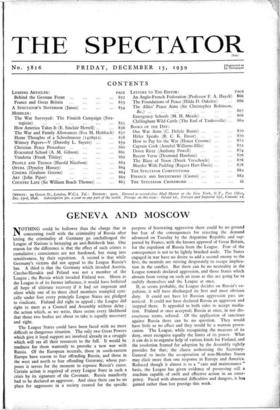GENEVA AND MOSCOW
NOTHING could be hollower than the charge that in concerning itself with the criminality of Russia after letting the criminality of Germany go unchallenged the League of Nations is betraying an anti-Bolshevik bias. One reason for the difference is that the effect of such crimes is cumulative ; consciences are not hardened, but stung into sensitiveness, by their repetition. A second is that while Germany's victims did not appeal to the League Russia's has. A third is that the Germany which invaded Austria, Czecho-Slovakia and Poland was not a member of the League ; the Russia which invaded Finland was. Shorn as the League is of its former influence, it would have forfeited all hope of ultimate recovery if it had sat impotent and silent while one of its three chief members trampled cyni- cally under foot every principle League States are pledged to vindicate. Finland did right to appeal ; the League did right to meet as a Council and Assembly without delay ; the action which, as we write, there seems every likelihood that those two bodies are about to take is equally necessary and right.
The League States could have been faced with no more difficult or dangerous situation. The only two Great Powers which give it loyal support are involved already in a struggle which will tax all their resources to the full. It would be madness for them wantonly to provoke a new war with Russia. Of the European neutrals, those in south-eastern Europe have reason to fear offending Russia, and those in the west and north to fear offending Germany, whose pur- poses it serves for the moment to espouse Russia's cause. Certain action is required of every League State in such a crisis by its signature of the Covenant. Russia manifestly had to be declared an aggressor. And since there can be no place for aggressors in a society created for the specific purpose of frustrating aggression there could be no ground but fear of the consequences for rejecting the demand advanced on Tuesday by the Argentine Republic and sup- ported by France, with the known approval of Great Britain, for the expulsion of Russia from the League. Fear of the consequences is not to be lightly brushed aside. The States engaged in war have no desire to add a second enemy to the first; the neutrals are striving desperately to escape implica- tion in the conflict. But there can be no neutrality in the League towards declared aggression, and those States which abstain from voting on such an issue as this are going far to stultify themselves and the League at once.
If, as seems probable, the League decides on Russia's ex- pulsion, it will have discharged its first and most obvious duty. It could not have let Russian aggression pass un- noticed. It could not have declared Russia an aggressor and stopped there. It appealed to both sides to accept media- tion. Finland at once accepted; Russia at once, in not dis- courteous terms, refused. Of the application of sanctions against Russia there can be no question. They would have little or no effect and they would be a wanton provo- cation. The League, while recognising the measure of its duty, must recognise equally the limits of its power. What it can do is to organise help of various kinds for Finland, and the resolution framed for adoption by the Assembly rightly provides for that; the clause authorising the Secretary- General to invite the co-operation of non-Member States may elicit more than one response in Europe and America. Reduced though it almost is to a " care and maintenance " basis, the League has given evidence of possessing still a machine capable of swift and effective action in an emer- gency. Faced with abnormal difficulties and dangers, it has gained rather than lost prestige this week.








































